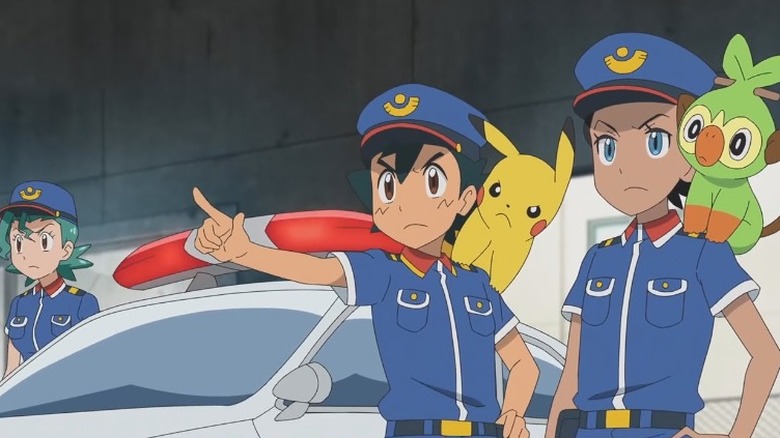The Disturbing Reason Pokemon Go Got These Police Officers Fired
"Pokemon Go," the location-based augmented reality game that continues to be popular even years after its release, is typically a pretty innocuous way to spend an afternoon. The mobile title encourages players to get out into their communities and explore their neighborhoods while searching for Pokemon in the "wild." Players can even catch rare shiny Pokemon, an element that only fuels the collection aspect of the title. Sometimes, players need to search repeatedly to build the team they want, working diligently to become a "Pokemon Go" master. However, when the search eats into one's work time, it can be a real problem. Two LAPD officers found that out the hard way, losing an appeal for a 2017 case involving the game that cost them their jobs. But what exactly happened and why is it coming to light now?
The Axios Gaming newsletter covered the case on Jan. 10, explaining that in 2017, two police officers were fired for ignoring a call for backup at a robbery. Their reason for skipping out on the robbery? Well, they really needed to catch 'em all. In the newsletter, Stephen Totilo detailed the highlights of the 2017 case, noting that the story is back in the news because the officers recently lost their appeal. Here's what you need to know about the case.
A suspicious alibi
A recently published court document (made public after the former officers lost the appeal) detailed the case in great detail, bringing several disturbing facts to light. Former officers Louis Lozano and Eric Mitchell filed an appeal after being found guilty and being subsequently fired. The document explained, "a digital in-car video system (DICVS) recording ... captured petitioners willfully abdicating their duty to assist a commanding officer's response to a robbery in progress and playing a Pokemon mobile phone game while on duty." In other words, instead of responding to their superior's call for help on a robbery, which was actively unfolding, the duo decided to hunt for Pokemon instead.
Although Lozano and Mitchell never argued that they weren't playing "Pokemon Go" on duty, the pair appealed the case based on the use of DICVS, which recorded their private conversations are are supposed to be protected by law. However, the details of the case outweighed the complaint of the former officers.
The court document explained that on the day of the incident the police captain was on his way to a homicide case when he received a call for a robbery in progress. Already nearby, he noticed a police car near the mall and called its officers to assist with the robbery while he continued on to the homicide scene. When the car didn't respond, the captain was forced to address the robbery himself, stretching the department even thinner than it already was.
Later, the captain spoke with Lozano and Mitchell, but ultimately concluded they simply hadn't heard the radio call. Later, a Sergeant involved in the case decided to look at the pair's DICVS recording in order to see what their typical day was like, just to see why they might not have heard the call. What he heard shocked him.
The hunt for Snorlax
The officers decided to ignore the radio request for backup, instead choosing to chase Pokemon in "Pokemon Go." The recording caught Mitchell telling Lozano that "Snorlax just popped up" at "46th and Leimert," sending the pair in pursuit of the Sleeping Pokemon. After catching Snorlax, the officers hunted a Togetic, with Lozano murmuring "don't run away, don't run away..." as he attempted to catch it.
When pressed by their superiors about the incident, the officers said that they were "having a conversation about Pokemon Go," not playing it. Unfortunately for them, their lie didn't go over well. Lozano and Mitchell were eventually fired, and they lost their appeal as well. The verdict was unanimous.
Twitter commenters were quick to respond to the case, with one noting that "I love playing GO, but there is a time and a place for it. When you think of what could have happened while these officers were focused on hunting a Snorlax instead of doing their jobs, it's very upsetting." Many "Pokemon Go" fans shared the same sentiment, wondering if the lives of citizens might have been endangered by the officers' refusal to respond to a call. Others simply commented that Snorlax isn't even all that rare, and definitely not worth losing one's job over.
While reading about "Pokemon Go" terms in court documents might be funny (how strange is it to explain "Pokemon" to non-fans?), the case ultimately determined that the officers put lives in danger in order to play a game. That, in addition to their dishonesty about the incident, was enough grounds to terminate their employment.



